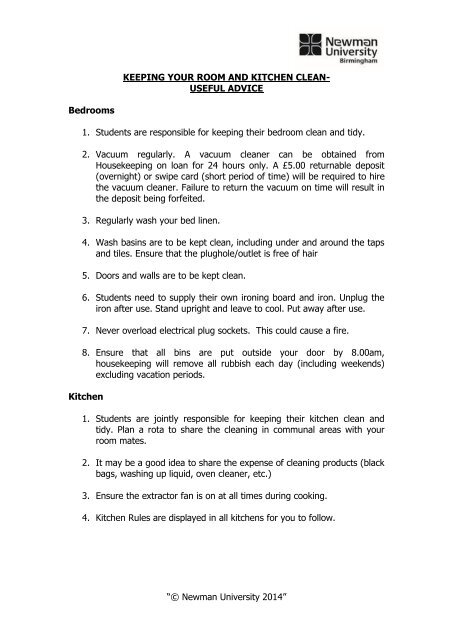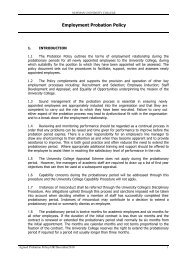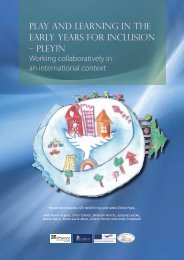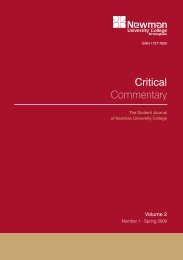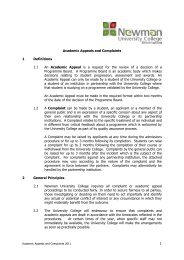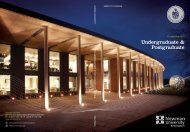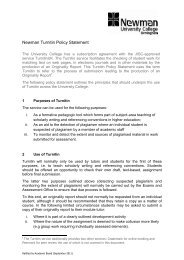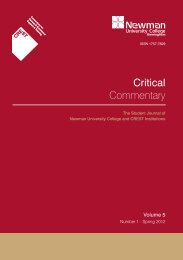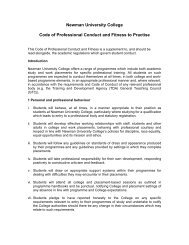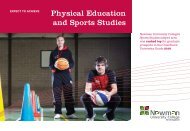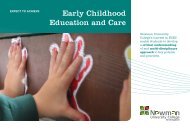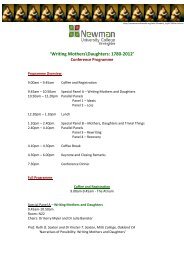KEEPING YOUR ROOM AND KITCHEN CLEAN - Newman ...
KEEPING YOUR ROOM AND KITCHEN CLEAN - Newman ...
KEEPING YOUR ROOM AND KITCHEN CLEAN - Newman ...
You also want an ePaper? Increase the reach of your titles
YUMPU automatically turns print PDFs into web optimized ePapers that Google loves.
2. Put crockery etc. away into cupboards.WORK SURFACES1. After preparing meals, wipe them clean for the next person.2. Never leave drainers on work surfaces. Excess water will cause damage.SINKS1. Keep sink clear of crockery, etc.2. Clean regularly.3. DO NOT pour grease, fat or food (i.e. rice, noodles) into the sink.4. Wipe excess water from under drainers to prevent water becomingstagnated.FRIDGE/FREEZER1. Wipe the inside of the fridge regularly.2. Throw away unwanted or out of date food.3. Wipe exterior of fridge removing finger marks, etc.4. The freezer should be defrosted at least once every three months.TOILET1. Always flush after use.2. Clean the toilet after use if stained.3. A toilet brush and holder are provided for cleaning the toilet.SHOWER – EN – SUITE <strong>ROOM</strong>S ONLY1. Always clean the shower tray after use.2. Regularly clean the shower screen/curtain and tiles removing all soapsplashes, etc.3. Damp wipe all fixtures and fittings.4. Ensure that the plughole/outlet is free from hair.5. Clean the floor regularly.Things you will need to purchase for cleaning:-<strong>KITCHEN</strong>Washing up liquidCleaning clothsGreen scourerCream cleanerAll purpose cleanerAir freshener (optional)Oven cleanerRubber glovesIroning board/Iron“© <strong>Newman</strong> University 2014”
The following are provided:-Kitchens - Mop/bucket, broom, dustpan/brushToilets - Toilet Brush/HolderBathrooms - Cloth, green scourer, cleaner, bath mat and shower curtainPLEASE ASK THE HOUSEKEEPER OR ACCOMMODATION MANAGER IF <strong>YOUR</strong>EQUIRE ANY ADVICE REGARDING <strong>CLEAN</strong>ING.BATH<strong>ROOM</strong> <strong>CLEAN</strong>ERBathroom cleaner is provided by Housekeeping so that students can clean thebathroom before and after use.1. In the event of ingestion, rinse mouth thoroughly, drink plenty of waterand seek medical attention.2. Prolonged contact may cause dryness of the skin, please seek medicaladvice if any discomfort is experienced.3. In the event of contact with the eye, irritation is likely, promptly washthe eyes with plenty of water and seek medical attention if discomfortcontinues.GUIDELINES FOR FOOD HYGIENE IN HALLSWash your hands before starting to prepare or eat any foodKeep work surfaces cleanCheck the label on any food - make sure none of it past its “use by” dateSeparate raw meat/fish from ready to eat foodCooking - make sure the food is hot enough and thoroughly cooked through- Never refreeze food that has been already frozen and then defrostedDeal with leftovers safely– cool food as quickly as possible before putting in the fridge– never reheat food more than once – Never reheat Rice– Do not keep leftovers for more than 2 daysKeeping your kitchen clean is essential to keep food safeStoring Store raw meat and poultry in clean sealed containers on thebottom shelf of the fridge, so they can't touch or drip onto other foodMake sure your fridge is cold enoughCross-contamination“© <strong>Newman</strong> University 2014”
This is the final operation in the battle against germs. They mustn't beallowed to spread around your kitchen and invade food that's ready to eat!This is one of the major causes of food poisoningHere are a few simple things you can do to help stop it happening:– keep raw meat separate from ready-to-eat food– don't let raw meat drip onto other food – keep it in sealedcontainers at the bottom of your fridge– never use the same chopping board for raw meat and readyto-eatfood without washing the board (and knife)thoroughly in between– Don’t wash meat before cooking it. Washing doesn't get ridof harmful germs – only proper cooking will. You also run therisk of splashing germs onto worktops and utensils– Wash your handsWash your handsYour hands can easily spread bacteria around the kitchen and onto food. Thisis why it's important to always wash your hands thoroughly with soap andwarm water at each of these times: before starting to prepare food after touching raw meat, including poultry after going to the toilet after touching the binDon't forget to dry your hands thoroughly as well, because if they are wetthey will spread bacteria more easily.Keep worktops cleanDon't forget to change dish cloths and tea towels regularly. They may lookclean, but they're the perfect place for bacteria to grow.It's very important to keep worktops and chopping boards clean because theytouch the food you are going to eat. If they aren't properly clean, bacteriacould spread to food and make you ill. Always wash worktops before you start preparing food. Wipe up any spilt food straight away. Always wash worktops thoroughly after they have been touched byraw meat, including poultry, or raw eggs. Never put ready-to-eat food, such as salad, bread or fruit, on aworktop or chopping board that has been touched by raw meat, unlessyou have washed it thoroughly first.Check the labelAnother important stage when you’re preparing food – to help keep you safe– is to have a look at the food labels to make sure everything you’re going to“© <strong>Newman</strong> University 2014”
use has been stored correctly (according to any storage instructions) and thatnone of the food is past its ‘use by’ dateSeparate raw meat/fish from ready-to-eat foodRaw meat and fish contain harmful bacteria that can spread very easily toanything they touch, including other foods, worktops, chopping boards andknives.It's especially important to keep raw meat and fish away from ready-to-eatfood, such as salad, fruit and bread. This is because these types of food won'tbe cooked before you eat them, so any bacteria that get onto the food won'tbe killed.To help stop bacteria from spreading, remember these things: Don't let raw meat or fish touch other food. Never prepare ready-to-eat food using a chopping board or knife thatyou have used to prepare raw meat or fish, unless they have beenwashed thoroughly first. Always wash your hands thoroughly after touching raw meat or fishand before you touch anything else. Always cover raw meat or fish and store them on the bottom shelf ofthe fridge where they can't touch or drip onto other foods. Don’t wash raw meat before cooking it. Washing doesn't get rid ofharmful bacteria – the only way to do this is by cooking the foodthoroughly. If you wash raw meat or fish you also run the risk ofsplashing bacteria onto worktops and utensils. If you are preparing chicken don't wash poultry or game-bird meatbecause any splashing might spread bacteria around the kitchen wash utensils and work surfaces thoroughly in warm soapy water afteruse and, if possible, disinfect them wash your hands thoroughly in warm soapy water after handling rawpoultry and dry thoroughly Never refreeze food that has already been frozen then defrostedCookingCooking food properly will help make sure that any harmful bacteria arekilled. Eating food that isn't properly cooked could give you food poisoning.Making sure food is hot enoughTo test if food has been properly cooked, check that it’s steaming hot all theway through. This means it’s hot enough for steam to come out.Checking if meat has been properly cookedIt's very important to make sure that poultry, pork and meat products such asburgers, sausages and kebabs are properly cooked all the way through.“© <strong>Newman</strong> University 2014”
If you’re checking a burger, sausage, or a portion of chicken or pork, cut intothe middle and check there is no pink meat left. The meat should also besteaming hot in the middle.LeftoversIf you have cooked food that you aren't going to eat straight away, cool it asquickly as possible (ideally within one to two hours) and then store it in thefridge. Make sure your fridge is between 0°C and 5°C.Don't keep leftovers for longer than two days.When you reheat food, make sure that it's steaming hot all the way through.If the food is only warm it might not be safe to eat. Don't reheat food morethan once.CleaningKeeping your kitchen clean is essential to keep food safe. Otherwise bacteriacan grow and spread.Right now, your hands could be carrying germs – thousands of them. They'reinvisible, and can easily spread onto food, making you and your loved ones ill.Stop the invasion before it's too late! Keep yourself and your kitchen clean bywashing and drying your hands thoroughly: before preparing food after touching raw food, especially meat after going to the toiletMake sure you keep worktops, chopping boards and utensils clean. If they’vebeen touched by raw meat, poultry or eggs, you'll need to wash themthoroughly.Don't forget to change dish cloths and tea towels regularly. They may lookclean, but they're the perfect place for germs to breed. Don't let the germswin!StoringIt's important to take care how you store food, to make sure it's safe to eat.You need to make sure your fridge is cold enough otherwise food poisoningbacteria will still be able to grow. Your fridge should be between 0ºC and 5ºC.If you’re not sure how the temperature setting or dial works on your fridge,you could use a fridge thermometer to check it’s the right temperature.Here are a few other fridge tips that you might find useful: keep the fridge door closed as much as possible wait for food to cool down before you put it in the fridge“© <strong>Newman</strong> University 2014”
if your fridge is full, turn the temperature down to help keep it coldenoughKeeping food in the fridgeTo help stop bacteria from growing, remember: When the label says 'keep refrigerated', make sure you do keep the foodin the fridge. If the food isn't labelled with any storage instructions andit's a type of food that goes off quickly, you should put it in the fridgeand eat it within two days. When you're preparing food, keep it out of the fridge for the shortesttime possible, especially when the weather (or the room) is warm. If you have made some food (such as a sandwich or a cold dish) andyou're not going to eat it straight away, keep it in the fridge until you'reready to eat it. If you're having a party or making a buffet, leave the food in the fridgeuntil people are ready to eat. Generally, you shouldn't leave food out ofthe fridge for more than four hours. Cool leftovers as quickly as possible (ideally within one to two hours) andthen store them in the fridge. Eat any leftovers within two days, exceptfor cooked rice, which you should eat within one day to help avoid foodpoisoning.Storing meatIt's especially important to store meat safely to stop bacteria from spreadingand to avoid food poisoning. Store raw meat and poultry in clean sealed containers on the bottomshelf of the fridge, so they can't touch or drip onto other food. Follow any storage instructions on the label and don't eat meat after its'use by' date. When you have cooked meat and you're not going to eat it straightaway, cool it as quickly as possible and then put it in the fridge orfreezer. Remember to keep cooked meat separate from raw meat.Kitchen Cleaning ChecklistCookers x 2TilesMicrowaveWork surfacesSink UnitHobsGrill panOven and oven doorClean throughout kitchen without anymarks or spillagesDoor inside/outsidePlateInside wallsClean and unclutteredSink“© <strong>Newman</strong> University 2014”
Fridges x 2FreezerFloorWallsWindowTapsSink doorDraining boardWashing up carried out regularlyDoor- inside/outsideShelvesInside wallDoor inside/outsideDrawersSwept and moppedClean and unmarkedWindow- unmarkedWindow sill- no spillages or wasteObstructionsStudents are responsible for ensuring there are no obstructions in kitchens,bathrooms or corridors which could be a hazard in the event of an evacuationor cause someone to trip over and hurt themselves. Students need to beaware of any protruding furniture in order to avoid injury to themselves orothersRefuse Disposal Refuse should be disposed of responsibly in the waste bins provided inthe bedrooms and communal kitchens. Refuse, including food itemsand cigarettes, should not be disposed of out of kitchen or bedroomwindows. Liquids should not be disposed of in communal kitchen or bedroomrefuse bins. This causes issues of spillage when the bins are beingemptied so students should ensure that all liquids are disposed of inthe sink. In the case of fats and oils, when cold, please dispose ofthem in a jar with a screw top lid or similar.Any broken glass needs to be disposed of responsibly to avoid anaccident. The broken glass should be either wrapped securely innewspaper (or similar) or put inside a box or other container. It shouldbe labelled as broken glass and disposed of in the refuse bin.Further action in the form of a fine or the disciplinary procedure will be takenagainst students found to be disposing of waste irresponsibly.SpillagesStudents are responsible for cleaning up any spillages in the kitchen andbedroom and alerting Housekeeping of any spillages in the bathroom andcorridors to avoid anyone slipping and hurting themselves.“© <strong>Newman</strong> University 2014”
RecyclingHalls Communal KitchenType of BinPlastic (Yellow)Cardboard (Clear)Metal (Black)Glass (Green)ContentPlastic bottles only.Any cardboard, no paper to berecycled in this bin.Any cans.Not broken. Broken glass to bewrapped up and disposed of withrubbish.The recycling bins are emptied by Housekeeping staff once a week, pleasecontact the Housekeeping office if your recycling bins are full and need to beemptied more often.Ground floor Edgbaston and Maryvale Hall corridorsType of BinPaper (White)Plastic (Yellow)Metal (Black)Glass (Green)ContentNo cardboard.Staples do not have to be removed.Glossy paper, envelopes, magazines,catalogues and newspapers can berecycled.Plastic bottles only.Any cans.Not broken. Broken glass to bewrapped up and disposed of withrubbish.The recycling bins are emptied by Housekeeping staff as and when required.Houses (1-4 <strong>Newman</strong> College Close, 42 & 44 Genners Lane)Type of BinGreenBlueContentPlastic, glass, metalPaper/cardboard“© <strong>Newman</strong> University 2014”
The recycling bins are emptied on a Tuesday morning every fortnight by thelocal council.Students are required to leave their rubbish outside every Monday evening forcollection first thing every Tuesday by the Refuse Operatives. Recycling binsmust be taken up to the entrance of the drive of <strong>Newman</strong> College Close.HeatingIf the bedroom becomes too hot (rather than open the window if the heatingis on) please note the temperature can be controlled by turning theThermostatic Radiator Valves (TVRs) down or off to (0). This greatly reducesCO2 emissions and costs.Heating is provided from October until March, unless temperatures fall belowrequired regulations.In addition, you can ventilate your room by adjusting the vent located at thetop of the window by pushing it to the side to allow air into the room or tothe closed position so that there is not a draught in the room. Please see anexample below.Use of KitchenResidents are responsible for the cleaning of communal kitchens. Allrefuse is to be deposited in the bin provided which will be emptied on adaily basis.“© <strong>Newman</strong> University 2014”
Residents are required to show consideration to other users bywashing up promptly and wiping down surfaces after use. Washing upof crockery and cooking utensils is not the duty of the Housekeepingdepartment.To adhere to health and safety regulations, there should be no morethen seven students using the communal kitchens at any one time.Students should be considerate to other users when inviting guests andshould only have one guest in the kitchen at any one time. It is notappropriate to use the kitchen as an area to congregate.The cooker and hob do not function at the same time, Please see theinstructions in the kitchen folder supplied in the communal kitchen.Unfortunately no extra furniture is allowed in kitchens, for instance,tables or chairs etc. Items of clothing or foot wear must not be left inkitchens or on radiators and will be removed by the Housekeepingteam. Washing lines are not permitted in kitchens.Televisions are not allowed in kitchens as these areas are not coveredby a TV licence and present a health and safety risk.Students in Halls are responsible for keeping their kitchen locked whennot in use. The door must never be propped open because thiscontravenes health and safety regulations as it is a fire door. Unlessproved otherwise, residents are collectively responsible for the securityof their allocated kitchen. The University does not accept responsibilityfor any loss or damage to residents’ or other individual’s property.Disciplinary procedures or the imposition of a fine against the users ofa kitchen, may occur if the door is found to be propped open.The University does not accept any responsibility for frozen food lost asa result of a breakdown or power cut. The student would need tocheck with the insurance provider to find out if they are eligible tomake a claim.The use of chip pans or deep fat fryers in kitchens or anywhere else inHalls of Residence is strictly forbidden. Only saucepans and woks arepermitted and they should never be filled with more than a third full ofoil.Items of any material should not be hung from doors and windows inkitchens or above cooking appliances.“© <strong>Newman</strong> University 2014”
It is the responsibility of all residents to inform the Housekeeper of anydamage, fault or disrepair existing within kitchens as soon as it isdiscovered.Students need to take care when using and storing sharp object suchas knives and scissors to ensure no harm to themselves or others.Students need to follow instructions and guidance provided with allfood items to ensure that they are stored and cooked correctly in orderto prevent food poisoning.Students should not leave cooking unattended at any time as this maycause a fire risk.Students should be aware that cooking surfaces may remain hot afteruse and take care when touching any cooking appliances.Students are responsible for cleaning up any spillage on the worksurfaces, appliances or floors to maintain the kitchen to an acceptablestandard for all users and to avoid anyone slipping and hurtingthemself.Condition of KitchensKitchens will officially be checked once a week by the Halls Housekeeper,usually on a Monday. Any kitchens that are not satisfactory will be reported tothe Accommodation Manager who will liaise with the students involved.If students have any issues with the condition and use of the kitchen, initiallythey should discuss this with all users of the kitchen and if this is notresolved, report the issue to the Accommodation Manager.If the level of cleanliness continues to be unacceptable, users of the kitchenwill be required to attend a meeting with the Accommodation Manager.In the event of this issue not being resolved, the Housekeeping staff will becommissioned to clean the kitchen. The costs will be shared between thestudents allocated to the kitchen. If payment is not subsequently received,then the Debt Management procedure will commence.Failure to maintain the kitchen to an acceptable standard may result inDisciplinary Procedures being instigated.“© <strong>Newman</strong> University 2014”
Closure of KitchensThe kitchen will be closed for cleaning by the Housekeeping Department forup to a maximum of one day. During this time the students allocated to thiskitchen will not have access and a notice will be displayed on the kitchendoor.Condition of BedroomsBedrooms will officially be checked, with prior notice, three times ayear by the Halls Housekeeper and another staff member. The studenthas the right to be present at the inspection if they wish and mustmake arrangements with the Housekeeping department.The student is obliged to maintain a safe environment for <strong>Newman</strong>employees who may have to access the premises, for instance byensuring that cables to personal electrical equipment do not cause ahazard.The curtains provided in bedrooms are fire retardant and shouldtherefore due to health and safety regulations not be replaced byalternative curtains belonging to the student.Washing lines are not permitted in bedrooms although students areable to use clothes airers if they wish.Clothing or other items are not to be hung from the smoke detectorwiring in the bedrooms and the smoke detectors should never becovered up as this contravenes fire safety regulations.The student will be charged a fine if they contravene the health andsafety regulations in their bedroom.DoorsStudents are required to keep the kitchen doors shut at all times, when thekitchen is not in use and also when occupied. The kitchen door should be keptshut and cupboards locked in order to prevent theft from kitchens as anunlocked door is an invitation to any would be thief.It is a requirement of the Fire Regulatory Reform Act Risk Assessments thathave been carried out, to keep the kitchen door closed when unoccupied. It isalso identified as best practice to keep the kitchen door closed even whenoccupied to avoid setting off the smoke alarms and so that the doors areclosed in the event of a fire. This is to prevent the spread of fire and“© <strong>Newman</strong> University 2014”
combustion products. Wedges of any description should not be used to propopen any doors in Halls of Residence at any time.The same applies to bedroom doors which should be closed when the room isunoccupied or when students leave their room, even if only for a briefperiod.Kitchens will be regularly checked in Halls of Residence to ensure that thisregulation is being adhered to. Further action will be taken against students ifthey contravene this important Health and Safety regulation.WindowsScrews should not be removed from window opening restraints fittedto bedroom, kitchen or any other window in Halls of Residence. Thiscontravenes Health and Safety regulations and students may besubject to a fine or Disciplinary Procedure. This regulation is to protectthe safety of residents, their guests and staff.No flags, towels or any other items are to be hung out of the windows.No adhesive items are to be attached to the windows in bedrooms orkitchens.Use of BathroomsStudents are required to leave the bathroom in an acceptable conditionafter use and to show consideration to fellow users.Items of clothing or foot wear must not be left in bathrooms and willbe removed by the Housekeeping team.Washing cannot be left in bathrooms to dry, either on airers or on theradiator.Clothes should not be washed in the communal bathrooms.Students are not allowed to dye hair or clothing in the bath or sinks.Students are not allowed to wash up kitchen utensils in the bath.Students and their guests should only use the bathroom to which theyhave been allocated or invited to use. In no circumstances shouldstudents use other bathrooms whilst passing as this invades privacyand may cause inconvenience or alarm.“© <strong>Newman</strong> University 2014”
Students allocated to an en-suite bedroom with a private bathroom,must not dispose of any items other than toilet paper down the toilet.Mis-use of the toilet will result in repairs being required and chargesbeing incurred by the student. Students should not put anyinappropriate items in the toilet as it could cause a blockage and willinconvenience all users.Students may be subject to a fine of up to £20.00 if they do not adhereto these regulations.Condition of LandingsSo as to ensure safe evacuation in the event of fire, corridors, landings, stairsand hallways must be kept clear at all times.Washing cannot be left on landings to dry, either on airers or on theradiator.Items of clothing or foot wear must not be left on landings and will beremoved by the Housekeeping team.Unfortunately no extra furniture is allowed on landings such as tablesor chairs etc.Materials on Walls and DoorsThe bedroom doors are fire rated doors to prevent a fire in a bedroomspreading into the corridor or a corridor fire reaching the bedrooms, thereforeprotecting the occupants. NO POSTERS, FITTINGS OR ATTACHMENTS CANBE FIXED TO THESE DOORS EXCEPT THE STATUTORY FIRE NOTICE.Students cannot display posters etc on walls or doors on the landingsor communal areas in Halls (including bathroom, toilet and kitchendoors).Students should not use staple guns on walls, notice boards or doors.Students should use white tac or drawing pins and not blu tac on thenotice boards in their bedrooms. No items should be affixed to thewalls, ceiling or furniture.No items should be displayed on walls in the kitchen above the cookersor toasters as this presents a fire risk.“© <strong>Newman</strong> University 2014”
Students may be subject to a fine of up to £20.00 if they do not adhere tothese regulations.Electrical equipmentThe University operates on a standard 240 volt ac electrical supply system.Rooms are fitted with two double sockets which are suitable only for lowpower items such as hand-held hairdryers (max 1200Watts),clock/radios/CD/DVD players and televisions. Room socket or landing outletsmust not be used for kettles, curling tongs, cooking equipment (microwaves,toasters, sandwich makers, cooking rings, blenders, rice cookers etc) or anyitems rated above 500 watts. Cooking equipment items are only to be used inthe kitchens which are located within the Halls of Residence. All items mustbe electrically safe and conform to the appropriate current British Standards.If any cooking appliances are found on landings or used in rooms they will beconfiscated until the end of the semester.The use of any form of space heating equipment (electric/calor gas heatersetc) anywhere in Halls of Residence is strictly forbidden.On each landing there is a 13 amp socket outlet that may be used for ironsand vacuum cleaners only. It is, however, important that great care is takenwhere these sockets are used. On no account are students to use trailingleads to gain power in rooms from the landing sockets. Landings must be leftclear to avoid blocking fire escape routes and trailing leads are particularlyhazardous.Students are responsible for ensuring that any electrical equipment they bringinto Halls meets current Health and Safety and electrically safe standards andis maintained in such a condition so as to prevent danger to themselves orothers or cause damage to University property. Students are obliged tomaintain a safe environment for <strong>Newman</strong> employees who may have to accessthe premises, for instance, by ensuring that cables to electrical equipment donot cause a hazard.Any potentially dangerous personal electrical equipment found will beremoved for safekeeping with the maintenance department untilarrangements are made to make it safe or to be removed permanently fromsite. Any concerns on the safe condition of personal electrical equipmentshould be reported to the Housekeeping office or Estates office.Vacuum cleaners, irons and ironing boards are to be removed from landingswhen not in use. There is to be no tampering with electrical fittings bystudents and all electrical faults or dangerous equipment should be reportedto the University Maintenance Department.“© <strong>Newman</strong> University 2014”
Compact fridges up to a maximum size of 500mm x 500mm x 500mm andmini-fridges may be used in study bedrooms. No fridges are to be sited onlandings and will be removed immediately if found. Any personalfridges/freezers must be removed from the premises or disposed of by theowner at the end of the contract period, if they break down or if they are nolonger required. If the University has to remove and dispose of anyfridge/freezer, this will result in a charge being incurred by the student.Cookers should only be plugged into the socket outlets fitted with ResidualCurrent Devices (RCD). RCD socket outlets can be identified by having theadditional test and reset buttons on them.Payment for damage or lossStudents will be required to sign an inventory of their bedroom and kitchencontents when they sign their accommodation contract. Any items lost ordamaged or left in an unacceptable level of cleanliness must be paid for bythe occupant and in the case of the communal kitchens it will be sharedbetween the students allocated to this kitchen. A list of the indicative costs forreplacing items is below, please note that costs may vary.Residents will be charged for damage caused to building fabric, appliances,fixtures and fittings provided in bedrooms and kitchens which is not due tonormal wear and tear and for any losses which may be incurred. Theassessment of any charge to be paid will be made by the AccommodationManager. Where it is impossible to identify the individuals responsible, theinvoice will be issued to all residents sharing the facility, who will be heldjointly responsible. Failure to settle invoices may result in withdrawal ofresidential status. Students have the opportunity to follow the AppealProcedure if they wish.ITEM REPLACEMENT INDICATIVE COSTS <strong>AND</strong> CHARGES(INCLUDING VAT)ITEM COST ITEM COSTMetal Frame Bed £130.00 Kitchen Chair £28.00Wooden Frame £125.00 Kitchen Table £55.00BedMattress £90.00 Cooker £87.50Mattress Cover £11.00 Microwave £45.50Easy Chair £78.96 Microwave plate £22.80Desk £78.00 Fridge £207.00Hard Chair £42.00 Freezer £195.00Bedside Cabinet £62.00 Kettle £12.80Bin £2.50 Toaster £10.25Light shade £7.50 Mop head and £8.50“© <strong>Newman</strong> University 2014”
handleTable Lamp £9.50 Mop Bucket £6.25*Bedding Pack £42.68 Dustpan/Brush £3.49Curtains £110.00 Broom £4.25Notice-board £35.00 Bin £12.50Strip Light £25.00 FireExtinguisherMirror £40.00 Fire Blanket £15.00Bedroom key £10.00 Kitchen Folder £15.00Door Number £5.00 Cupboard key £10.00Perspex Holder £5.00 Kitchen Key £10.00Vacuum Cleaner £128.00 Toilet Roll £9.00HolderRe-carpet Quote Toilet£3.00Brush/HolderRe-decorate Quote Shower Curtain £11.50Refill £20.00 - dry powderRefill £30.00-water.Replacement £50.00*Bedding pack includes quilt, quilt cover, two sheets, two pillows, two pillowcase’s, two pillow protectors and two towels. Duvet cover £7.50, Sheet £5.00.Additional ChargesUnless a student is shown to be solely responsible, communal areas are theshared responsibility of residents and all students allocated to the kitchen willbe charged for the cost of replacing damaged or missing items from withinthese areas, plus the cost of the damage or loss.The use of pins, tacks, blu tack or white tack, adhesive tape or any othersticky substances is not permitted on the walls or ceilings of theaccommodation. A charge of £25.00 will be levied for removal of adhesivematerials from walls etc.A charge of £25.00 will be levied for removal of items from your room at theend of the Academic Year. Charges may be applied either during the contractperiod or following room and communal area checking on completion of theResidential contract.Failure to adhere to RegulationsStudents may be subject to a fine of up to £20.00 if they do not adhere to theregulations laid out in this handbook. In more serious or persistent cases theDisciplinary Procedure will be implemented.Debt Management Policy“© <strong>Newman</strong> University 2014”
The University has a Debt Management policy that covers the collection ofaccommodation fees. A copy of this policy in available in the student area ofsharepoint.Students are encouraged to engage in dialogue with the Finance Office if theyare experiencing difficulties in paying accommodation fees. If a student fallsbehind on payments, and does not positively engage in dialogue relating tothe outstanding debt, then the student will be issued with a notice to quit theaccommodation.Energy Management PolicyStudents are encouraged to be environmentally responsible in theirconsumption of energy and water. Please switch off lights, electricalequipment when not in use and do not waste water. The full policy documentis available on request from the Accommodation Manager.Health AdviceAre you registered with a GP?There are no medical facilities available here, although basic first aid isavailable. Resident students should register with a local practice(www.jigginslane.com). Please bring your medical card so that you canregister with the local Health Centre. To find another local dentist or GP,please visit the NHS website: www.nhs.uk.Local Medical PracticesJiggins Lane Surgery17 Jiggins LaneBartley GreenBirminghamB32 3LETel: 0121 477 7272Bartley Green Medical Practice71 Romsley RoadBartley GreenBirminghamB32 3PRTel: 0121 477 4300Woodgate Valley Health Centre61 Stevens AvenueWoodgate ValleyB32 3SD“© <strong>Newman</strong> University 2014”
Tel: 0121 426 0088Are your vaccinations up-to-date?It is advisable to be up to date with your immunisations, especially if you willbe participating in school placements. Your GP should be able to confirmwhether you are up to date with the following vaccinations:• Polio• Tetanus• Meningitis C• Measles, Mumps and Rubella (MMR)Please make arrangements for any required vaccinations to be given as soonas possible.What is meningitis?The meningococcal bacteria can cause two types of illness: meningitis andsepticaemia (blood poisoning). Of these, septicaemia is the more dangerousand the more likely to be fatal.The bacteria live in the nose and throat and are only passed on by prolonged,close contact. It has been estimated that between 10% and 20% of thepopulation are carrying the bacteria at any given time and the great majorityof people carry them without ever developing the disease.The important thing to know is that the disease can develop rapidly,sometimes within a matter of hours.What are the symptoms?Early symptoms may be similar to those you get with flu or ahangover: feeling feverish •severe headache vomiting •stiff neck, back and jointpainsIf any of the following symptoms develop: rash of tiny red bruises that don't fade underpressure severe dislike of light disorientation or comaGET MEDICAL HELP URGENTLY - REMEMBER EARLY TREATMENT SAVESLIVES“© <strong>Newman</strong> University 2014”
Remember: although meningitis is a potentially serious disease it is relatively rare if you are concerned about any symptoms you should contact a doctor if you are feeling ill, you should make sure that your friends (or HallTutor for residential students) know this - having someone check onyou could save your life.Other Health AdviceFor any other health related advice, please call NHS Direct on 0845 4647If you become ill during the night while in halls, contact the hall tutor forassistance. If you have called an ambulance due to illness or an accident,please inform the Hall Tutor on duty as soon as possible.Feeling Unwell? Choose the right servicewww.sbpct.nhs.ukPhone: 0845 46 47www.nhsdirect.ukJiggins Lane Pharmacy 4751654Bartley Green Pharmacy 4753425Jiggins Lane Medical Centre0121 4777272South Birmingham GP walk in centre15 Katie Road, Selly Oak. B29 6JG0121 415 2095Queen Elizabeth Hospital. B15 2TH0121 627 2000Useful ContactsAsthma:Lung Health:http://www.asthma.org.uk/http://www.lunguk.org/“© <strong>Newman</strong> University 2014”
Please DO NOT WEDGE DOORS OPEN, including main access doors tohalls of residence. This allows unauthorised access to persons who maynot have legitimate reason to be on University premises.DO NOT leave your bedroom or kitchen door open when you are notpresent.If you have any security issues between the hours of 7.30am and6.00pm then you need to contact either the:Porters on Ext. 2222Security on Ext. 2358Accommodation Manager Ext 2219Housekeeping on Ext. 2331After 6.00pm and through the night until 7.30am you need to contactthe Hall Tutor on duty. The Duty Hall Tutor can be contacted on07788443680. Please put this number into your mobiles so that it issomewhere you can find it.If concerned please contact the Police on 999 in an emergency or in anon-emergency on 0845 1135000.There is a 24 hours, seven days per week security presence on thecampus. Security patrols are conducted through the night.Halls are monitored by closed circuit TV systems for added security.Top 10 Crime Reduction Tips for StudentsAt Home1. Lock your bedroom door - even if you are only going to the kitchen orbathroom.2. Check doors and windows are locked at night or when going out.3. If you are residing in a house, set the security alarm prior to leavingthe building.4. Make a list of your personal property including the serial number anddescriptions - use an ultraviolet pen to mark electrical and other items.Personal Safety/Theft5. Think ahead - don’t walk home alone late at night - arrange in advanceto stay with a trusted friend or pre-book a taxi.“© <strong>Newman</strong> University 2014”
6. Never leave drinks unattended in pubs or clubs - when you go to thetoilet, ask your friends to keep an eye on your drink. Men’s drinks getspiked too. If you suspect your drink has been spiked, contact amember of staff or tell a trusted friend.7. Don’t show off your cash, mobile phone or laptop or leave them lyingaround - never leave your bag, wallet or purse unattended. Take outprotection for your credit cards and note all your card details at home,so you can cancel them quickly if they are stolen.8. Try to go to the cash machine in daylight if possible - be aware ofpeople standing too close to you and always conceal your PIN. If it’sdark, go with a friend if you can and don’t check your money in fullview.Vehicle Crime9. Always lock doors, windows, the boot and sunroof when leaving yourcar - even if it’s only for a few minutes.Absence from HallsStudents should notify the Accommodation Manager by e-mail if they aregoing to be away for a continuous period of 10 days or more.Television licencesThe following is an extract from TV Licensing, please see the web-site forfurther information www.tvlicensing.co.uk/information/students.jsp:Just like everyone else, students must be covered by a TV licence to watch orrecord television programmes as they’re being shown on TV. This applieswhether you live in halls of residence or a shared house.What you might not know is that television licensing law still applies to you nomatter what you use to watch television programmes as they’re being shownon TV. Whether it’s a laptop, mobile phone or any other device that receivestelevision programmes, you need to be covered by a TV licence. It’s the law.”Students are reminded that dealers selling or renting television sets arerequired by law to tell the Licensing Office of the sale/installation. TheUniversity assumes that all Students are complying with the law concerningTV licences. Please advise the TV licensing office regarding your room numberand the address of halls of residence.Students are required to bring their own free standing aerial to use with theirtelevision.“© <strong>Newman</strong> University 2014”
If a student has a television in their room which they are not using to viewlive television, they should contact TV licensing to advise.For those students who have been allocated a trial communal lounge, theyare responsible for a TV licence if they provide their own television in thelounge.University Smoking PolicyThe Smoke-Free Regulations 2006 came into force with effect from 1 st July2007. The University operates a total ban on smoking throughout the entirecampus except for the following designated areas:(a) Externally placed smoke shelters(b) In University owned student accommodation that is allocated as“smoking permitted” bedrooms only. All communal areas are non-smoking.Any breach of this policy will result in disciplinary action being taken.Students who do not wish to smoke and those who wish to smoke in theirbedrooms will be asked to display a no smoking/smoking sticker on theoutside of their door. The University will affix the door stickers.In student rooms designated as smoking rooms, students will be given aminimum of two hours notice (except in emergencies) of room inspection ormaintenance repair so that windows can be opened to purge and dissipatethe smoke.Good Neighbour PolicyThe student agrees that no disturbance or inconvenience will be caused toother students, staff or neighbouring premises, including during the workingday when staff are occupying offices located in halls of residence. The studentshall not make or allow any loud noise at any time. Students are not allowedto bring decks, or musical instruments such as drum kits etc which may causea noise disturbance in halls.ConductStudents are encouraged to act in a fit and proper manner at all times andhave consideration for their neighbours – both their fellow students and thelocal community as detailed in the Accommodation Contract clause 9.The student should not act in any way that could bring the University’sreputation into disrepute. Any student who creates a disturbance, displaysanti-social behaviour, causes damage or is responsible for unacceptable noise“© <strong>Newman</strong> University 2014”
levels may be issued with a fine, called before the Disciplinary Committee or,in more serious cases, be expelled immediately from Halls of Residence. Aminor offence may be dealt with by a fine of £25.00. A more substantialoffence will be referred to the Director of Finance and may incur a fine of£75.00, with mitigating circumstances reducing this to £50.00 andaggravating circumstances increasing the fine to £100.00.Minor damage or loss can incur compensation charges up to £250.00 withmore substantial offences incurring compensation charges up to £500.00 foridentified and quantified loss.Students should not allow the premises to be used for alcohol and substancemisuse as defined by the Misuse of Drugs act 1971. Security Staff or Policeaccompanied by a dog may be in halls to patrol from time to time.Student Disciplinary RegulationsThe Disciplinary Regulations are available on <strong>Newman</strong>’s SharePoint in thestudent handbook under the student policies section.The <strong>Newman</strong> Students’ Union is available to offer support to students whohave disciplinary procedures instigated against them.PetsNo pets of any description are to be brought into Halls of Residence, exceptfor guide dogs.External Advertising ProcedureStudents are not permitted to distribute calling cards, leaflets, fliers, postersor any other advertising materials within halls of residence or on campus onbehalf of any internal or external organisations. Any such requests need to bereferred to Rob Balding, Development Manager, <strong>Newman</strong> Students’ Union.End of YearStudents will be issued with clear guidelines regarding the standard ofcleaning and other arrangements that will be expected when the tenancycomes to an end.Current students will be required to vacate their bedroom by 8.00pm on thelast day of the academic year (Date dependant on course). Any student whohas difficulty in meeting this departure time, may stay in Halls until Sunday.Any students in this situation should contact the Accommodation Manager by4.30 p.m. on the Friday the week prior to the end of the academic year.“© <strong>Newman</strong> University 2014”
The student’s room key, kitchen key and cupboard key are to be handed intothe Housekeeping Department prior to departure for the summer vacation,where a receipt will be issued. The three keys need to be kept together eitheron a key-ring or in an envelope which can be supplied by Housekeeping ifnecessary. Students are liable for the loss of any keys if they have not beenissued with a receipt for their return.The Housekeeping office (Ground floor Littlemore Hall) will be staffed dailyduring the last week of term during the following times, for the collection ofkeys and issue of a receipt:11.30 a.m. to 2.00 p.m., Monday to Friday4.00 p.m. to 5.00p.m., Monday to Thursday4.00 p.m. to 4.30 p.m., Friday9.00 a.m. to 11.30 a.m., SaturdayStudents are required to return their keys even if they have been allocated aroom next year. Failure to hand in the room key will result in the lock on theroom being changed and a charge of £25.00 being raised against the student.If the student does not hand in either the kitchen key or kitchen cupboard keyissued, an additional charge of £10.00 per key will be incurred. The charge forreplacement house wills will be £15.00 for a bedroom key and considerablymore for a front door key as the lock with need to be changed and keysreplaced for all occupants.All rubbish needs to be removed from the bedroom and communal kitchen assoon as possible so that it can be disposed of.During the summer vacation nothing is to be left in the room, in the uppercupboard or in the communal kitchen. This includes posters on doors, walls orwindows and anything that is left behind will be disposed of. A charge of£25.00 will be levied for the removal of items from a student’s room. This willinclude the removal of blu-tack and similar adhesive materials from walls etc.The kitchen cupboards need to be left open so that they can be cleaned byHousekeeping. The fridge and freezer need to be left turned on andperishable food left inside and not disposed of in the bin.Unfortunately there will be limited storage space available for belongingsduring the vacation period. No liability can be accepted for any items left inrooms and these will be disposed of after the end of year. Students mustremove fridges from rooms as these will be disposed of if left behind.All bedrooms and kitchens will be checked to ensure that all items listed onthe bedroom and kitchen inventory are in place and undamaged and chargeswill be raised against the student for any loss, damage or additional cleaningcosts.“© <strong>Newman</strong> University 2014”
If on departure there is any damage, items missing, keys not handed in,room/kitchen left in an unacceptable state, or outstanding fees etc the costsincurred will be either deducted from the deposit or invoiced to the student ifthey are returning to halls. The deposit will be refunded normally within eightweeks after the end of the agreement. The accommodation deposit, minusany deductions if applicable, will be sent to the student’s home address in theform of a cheque payable to the student.ITEM REPLACEMENT INDICATIVE COSTS <strong>AND</strong> CHARGES(INCLUDING VAT)ITEM COST ITEM COSTMetal Frame Bed £130.00 Kitchen Chair £28.00Wooden Frame £125.00 Kitchen Table £55.00BedMattress £90.00 Cooker £87.50Mattress Cover £11.00 Microwave £45.50Easy Chair £78.96 Microwave plate £22.80Desk £78.00 Fridge £207.00Hard Chair £42.00 Freezer £195.00Bedside Cabinet £62.00 Kettle £12.80Bin £2.50 Toaster £10.25Light shade £7.50 Mop head and £8.50handleTable Lamp £9.50 Mop Bucket £6.25*Bedding Pack £42.68 Dustpan/Brush £3.49Curtains £110.00 Broom £4.25Notice-board £35.00 Bin £12.50Strip Light £25.00 FireExtinguisherMirror £40.00 Fire Blanket £15.00Bedroom key £10.00 Kitchen Folder £15.00Door Number £5.00 Cupboard key £10.00Perspex Holder £5.00 Kitchen Key £10.00Vacuum Cleaner £128.00 Toilet Roll £9.00HolderRe-carpet Quote Toilet£3.00Brush/HolderRe-decorate Quote Shower Curtain £11.50Refill £20.00 - dry powderRefill £30.00-water.Replacement £50.00“© <strong>Newman</strong> University 2014”
*Bedding pack includes quilt, quilt cover, two sheets, two pillows, two pillowcase’s, two pillow protectors and two towels. Duvet cover £7.50, Sheet £5.00.“© <strong>Newman</strong> University 2014”


